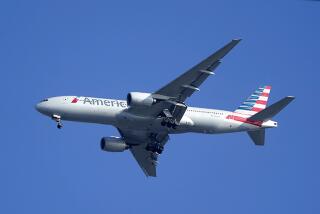Strict Rules Accompany ‘Companion’ Air Tickets : Airlines: Tickets aren’t transferable to another person, and there are no refunds--only credits for future flights.
- Share via
Stuart Campbell, 80, of Burbank took advantage of an airline’s 10% discount for seniors and a companion flying on the same flight and bought advance-purchase, non-refundable tickets for a round-trip flight from Burbank to Chicago. The reduced fare was $324 per person. Asked by the airline at the time of booking to name the companion he would be flying with, Campbell stated that it would be his niece, Carol, which is how the tickets were written.
But circumstances changed for Campbell on short notice and instead it was decided that his son, Douglas, would be his companion on the flight. “Since we know the airlines don’t check the names of passengers on domestic flights, we didn’t think this would create any difficulty,” Campbell said. “In addition, Doug’s travel agent indicated it probably wouldn’t be a problem for him to fly with me instead of Carol because we wouldn’t have to show identification.”
At the airport, Campbell and his son had difficulty finding the right gate, so they showed their tickets to the gate agent.
“We were allowed to board, but after we were seated, a stewardess suddenly came up and said my son couldn’t fly on the ticket he had with my niece’s name on it,” Campbell explained. “Evidently, the gate agent noticed that one ticket was written for a woman and we were two male passengers. If Doug had been a woman, even of a different name, they wouldn’t have known. Doug was told he would have to buy a new ticket, but he could do it at the discount rate of $324.
“With all the other passengers staring at us, my son signed a credit card payment. The stewardess left the plane, and then came back with a new ticket. In the stress of the moment, neither my son nor I checked the amount of the ticket, which turned out to be $390 and not $324.”
Upon returning home, Campbell’s son contacted the airline, which agreed to refund the difference between the regular fare of $390 and the discount of $324. Subsequently, he received a credit on his credit card statement.
In the meantime, Campbell sought a refund on the original $324 ticket purchased for his son as his companion on the flight. “After all,” Campbell said, “we didn’t cancel and we showed up for the flight.”
To his dismay, however, Campbell discovered that he couldn’t get a cash refund. Instead, he received a credit toward a future flight on the same airline.
Sorting this ticket misadventure out, consumers should realize that airlines are required under federal rules to have the names of passengers on their flights. “An airline would be in violation if it didn’t have the correct names of passengers at the time of flight,” said Elly Brekke, a spokeswoman for the Federal Aviation Administration.
She explained that the airlines need to have an accurate list for security and insurance/liability purposes. Thus, when a passenger skirts the system and flies on a ticket with someone else’s name, the ticket is invalidated and the passenger stands to lose any rights affecting airline liability and insurance coverage.
“We need to know the actual names of passengers on our flights, and we will confiscate the ticket of someone flying under another person’s name,” said Anthony Barnett, a reservations agent for American Airlines. “You’re on your own, and you’re not covered for any possible claims against us. You can also be charged the regular fare to fly.”
Airline tickets state that they are not transferable. However, the key issue is refundability. A regular fare, for example, permits a refund and allows the ticket to be reissued under someone else’s name. But if the ticket is non-refundable, there is no way to legally transfer it to someone else.
“Senior citizens can get a companion fare discount on many fares we offer, but they have to name the companion at the time of booking,” said Bob Harper of Delta, in reference to Stuart Campbell’s case. “If they purchase a non-refundable ticket, they can’t change that name later. If for any reason they can’t fly, there’s no refund, but they get a credit to fly on another flight--and separately if they want--but each would have to pay a $35 administrative fee.”
In April, 1992, the major U.S. airlines began a policy of charging passengers an “administrative fee” of $25--subsequently raised to $35 by some carriers--to cancel or change non-refundable tickets. Prior to that, most travelers who needed to change a non-refundable ticket simply forfeited the cost of the ticket. Airlines also stopped accepting a doctor’s note from passengers seeking a full refund of a non-refundable fare, claiming there had been too many abuses of the system. The only way a full refund is issued now is when the passenger dies, in which case the refund would go to the estate.
If travelers need to cancel a non-refundable ticket, they can also apply the cost of their unused tickets toward a new ticket, which can be to the same or a new destination. However, they still must follow the conditions of their original ticket.
When booking flights on a companion basis, or with any other discount ticket, travelers should ask travel agents and airlines what the carriers’ policies are on making changes on dates and itineraries.
More to Read
Sign up for The Wild
We’ll help you find the best places to hike, bike and run, as well as the perfect silent spots for meditation and yoga.
You may occasionally receive promotional content from the Los Angeles Times.






